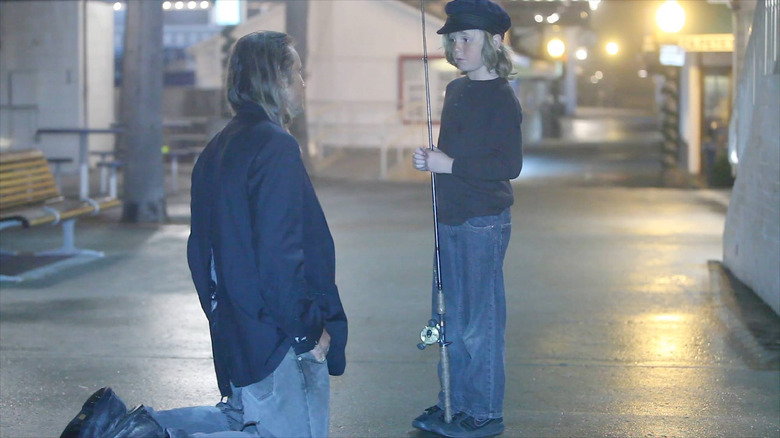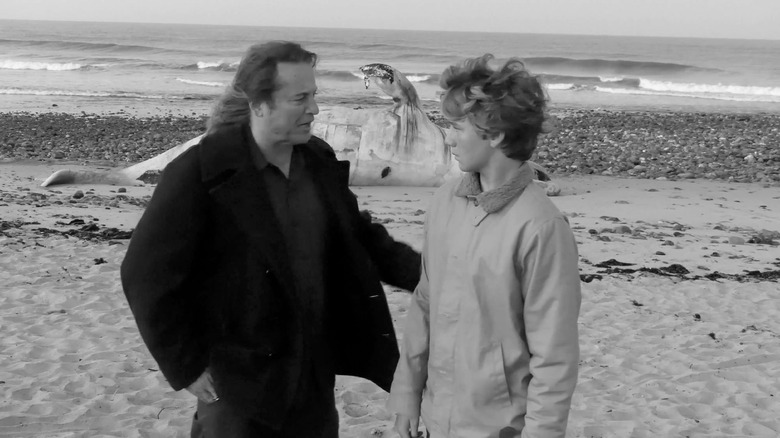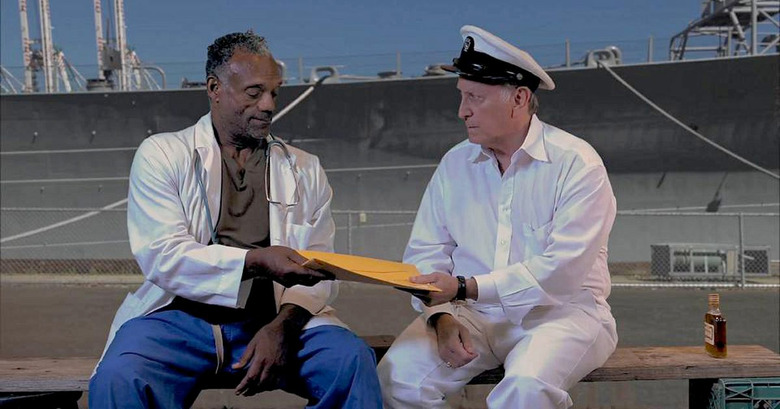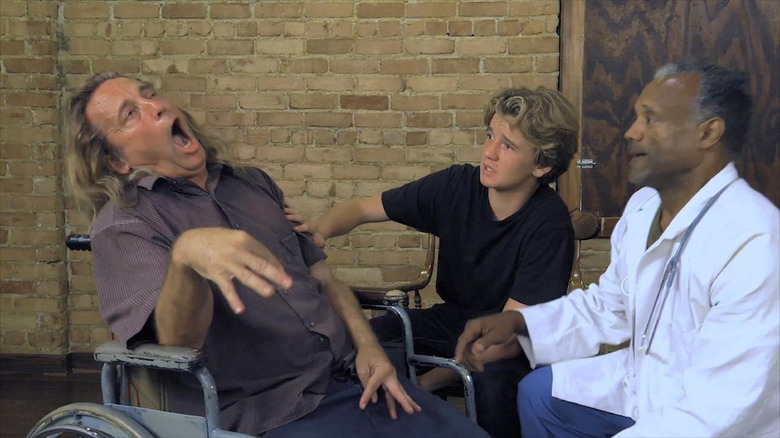'Surfer: Teen Confronts Fear' Delivers An Incompetent, Bizarre And Worthy Successor To 'The Room'
In popular cinematic discourse, few phrases are as poorly-applied as "so bad it's good." That phrase suggests a continuum of quality, with a sweet spot in which a movie can entertain despite – or because of – its ineptitude.
That's nonsense. Any continuum of quality would have to exist three-dimensionally to account for the vastness of cinema, and four-dimensionally to account for "that" kind of film. The best kind of "bad" movies are made with extreme passion, from unusual worldviews, and with little skill or taste – and as The Room proves, budget is no restriction on any of that. Often, the results feel like the raw outpourings of staggeringly strange minds. RE/Search Publications assembled many such films into a book entitled "Incredibly Strange Films," back in 1986, and that's a term I prefer to use.
Enter Surfer: Teen Confronts Fear, a film certainly made with intense passion, and thoroughly a modern Incredibly Strange Film. Short version: it's amazing, but to get into why, we've got to dig a little.
Surfer is the work of Douglas Burke, a California physics professor who – according to the film's website – has been experimenting with film his whole life. Despite that, this is "Burke's first work that is being made available to the public." That Surfer is the first work Burke deemed worthy of public dissemination – that finally showcased his talents and vision – is astonishing, and must be considered when watching it.
There's little to Surfer – and yet, so much. Told in maybe half a dozen scenes, you could literally write its story on the back of a napkin. Titular teen Surfer, characterised entirely by having been scared away from surfing by a big wave, is visited by a man who tells him to confront his fear. He confronts his fear. He surfs. And...that's about it, as far as broad-stroke plot and stakes go. But nearly everything about the execution is goddamn bizarre.
Act I: Ravings of an Electric Squid
Surfer's first scene effectively sets up how bonkers the movie is. The fact that it takes up half the film should be a hint; that it's mostly made up of a crazed monologue by Burke himself, another. Burke's character first appears unconscious, washing up onto shore as Surfer sullenly cuts fishing bait. Surfer helps him to shore, when out of nowhere the man announces "I'm here to help you. I'm your dad!" Specifically, he's the spirit of his long-dead dad, returned to give Surfer the courage to chase his dreams.
Burke is very specific about the mechanics of this spiritual reunion. There are so many details in Burke's unbroken ramble that I'd love to write about, but to do so would spoil some of 2018's best cinematic moments. It's rare that a poorly-framed two-shot is this captivating, and it's largely down to Burke's bizarre writing and performance. Phrases like "just like a hard jelly" and "squid and electricity" are invoked as explanation, yet only succeed in baffling further. Somehow, slack-jawed Surfer takes it in remarkable stride.
It doesn't take long for Surfer Dad to get spiritual. The mumbo jumbo comes thick and fast, often seemingly made up on the spot. Trying to make sense of the essences and dream worlds and energies about which Burke speaks is folly. Once it hits Christian philosophy, though, Burke's performance becomes downright feverish. He powers through his non-sequitur-filled monologue with the fervor of a street preacher, the far-out spirituality of Point Break's Bodhi, and the coherency of Rick Sanchez at his drunkest. At one point, he grips his son and cries, "do you understand?" No, Douglas, we don't – and we're okay with that.
Act 2: The Crashing Waves of Conspiracy
If the first half of Surfer is a slow-motion brain implosion, the second half blows its ideas back out through its skull. Once his ghost dad disappears back into the waves, Surfer is left with two directives: go surfing, and ask a man named Banks for money to pay for it. Immediately, the movie abruptly cuts to characters we don't know, with no explanation of who they are or what the hell they're doing. Get used to that.
It's difficult to recount the exact twists and turns of Surfer's second half, because none of it makes much sense. The military gets involved. Surfer becomes caught up in an IED disposal operation somewhere in California. Burke shows up as Surfer's dad, who isn't dead after all, but in a catatonic state so coarsely performed it wouldn't feel out of place in a Donald Trump speech. Timelines shift and blur. New characters appear and disappear at random. Some of them give Surfer advice about life, courage, and when it's okay to kill people. And I'm pretty sure there's a subplot about cloning in there somewhere. It's hard to tell.
And then, in what you might call its third act, Surfer undergoes a slow diminuendo until the credits just appear. For a movie with an hour-long monologue as its first scene, Surfer does at least end visually. The final quarter-hour is a montage of Surfer going on his expedition: practicing in a quiet marina, meditating, watching someone build a surfboard for him, and surfing for what seems like real-time hours. It'll induce sleep if it doesn't induce madness first.
The Courage to Waive Production Value
The story and performances alone would make Surfer: Teen Confronts Fear an incredibly strange film through and through. But the film is also poorly made, in some pretty unique ways. It's got a familiar HD home-video digital look like many cheap movies, sure, but that's not what's special.
There's a lot to talk about production-wise. Every cast member seems like they'd be a weird person in real life. Though much of the movie appears to have been shot without a script, Burke can occasionally be seen reading his lines from offscreen. In other parts, he's clearly just riffing – like jazz, baby. At least, it'd be like jazz if any live production sound made it into the mix; the whole first half of the movie is entirely ADRed, with Burke faithfully and flatly dubbing over even his line stumbles. Surfer's own voiceovers sound like they were recorded hastily, and in one take. Everything that happens at sea is filmed from the shore, making even the surfing footage dull and lifeless. One astonishing exposition dump is shot entirely on a greenscreen for no apparent reason. And Burke's score (of course he composed the score) fits the action so poorly it could be mistaken for temporary stock music.
The one startling piece of production value seems to have come about by happenstance. Part of Burke's opening (and continuing) monologue leads Surfer and his dad to a real, actual beached whale, subsequently used as a protracted and forced metaphor. And you bet your ass Burke shoots the shit out of that whale.
Conclusion
Surfer: Teen Confronts Fear is much like its title: peculiar, earnest, nonsensical, and assembled with little apparent understanding of how things are done. But not once does the movie feel anything but genuine: it's a treatise on spirituality by someone with undeveloped filmmaking knowledge – and with unresolved baggage regarding the military. Between its endless monologues and nonsensical story, it's hypnotically weird, sometimes edging on surreality.
I can't speak any higher than Surfer: Teen Confronts Fear than to say I am convinced that nobody on Earth could have made it except Doug Burke. It comes as a sort of anti-surprise that Burke wrote, directed, produced, starred in, and scored the film: the film feels like a glimpse into the man's brain that's more devastatingly insightful than he probably intended. Material this weird can't be made up: it has to flow through one's soul. Surfer: Teen Confronts Fear is rich with idiosyncratic intent and utterly bankrupt in self-awareness. And there's no finer Incredibly Strange qualification in the world than that.




